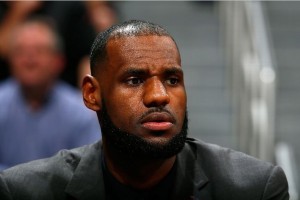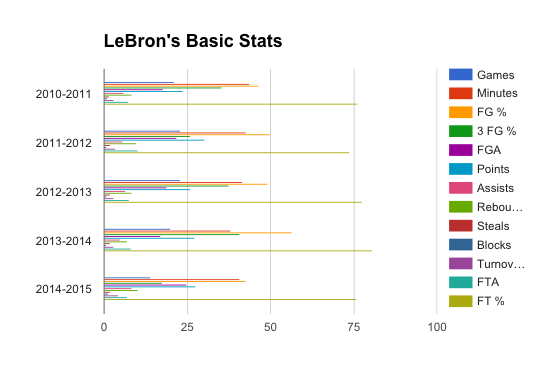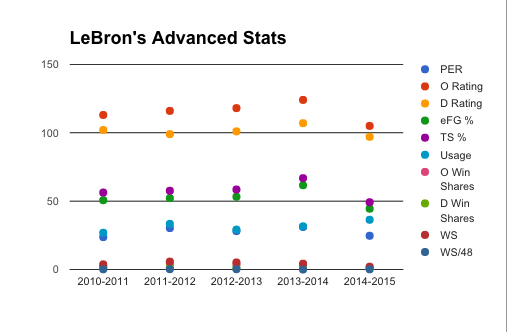For the fifth straight year, LeBron James is going to the NBA Finals.
How do his numbers stack up this season versus the past four seasons? It’s quite interesting.
James is deserving of all the praise he’s getting after becoming the first player to reach five consecutive NBA Finals since the dynastic Boston Celtics of decades ago. James has been asked to do more for the Cleveland Cavaliers on offense than even in his early-career Cavs days, and it’s taken a toll on his shooting numbers.
On the offensive end, James is easily having his least efficient postseason over the last five years in terms of scoring and shooting the basketball. On the other hand, James has never been better on defense in the postseason in his entire career. He’s been asked to rebound the ball more with Kevin Love out and he’s excelled in that capacity. James is even blocking shots at his highest rate in five years.
So it’s been a tale of extremes for James, whose Cleveland club has won 12 of its 14 postseason games this season.
To illustrate these extremes, here’s the first set of charts that outline his basic playoff stats over his last five postseasons (bold indicates league leader):
| LeBron’s Last 5 Postseasons | Games | Minutes | FG % | 3 FG % | FGA | Points | Assists | Rebounds | Steals | Blocks | Turnovers | FTA | FT % |
| 2010-2011 | 21 | 43.9 | 46.6 | 35.3 | 17.8 | 23.7 | 5.9 | 8.4 | 1.7 | 1.2 | 3.1 | 7.4 | 76.3 |
| 2011-2012 | 23 | 42.7 | 50 | 25.9 | 21.8 | 30.3 | 5.6 | 9.7 | 1.9 | 0.7 | 3.5 | 10.2 | 73.9 |
| 2012-2013 | 23 | 41.7 | 49.1 | 37.5 | 18.8 | 25.9 | 6.6 | 8.4 | 1.8 | 0.8 | 3 | 7.6 | 77.7 |
| 2013-2014 | 20 | 38.2 | 56.5 | 40.7 | 17 | 27.4 | 4.8 | 7.1 | 1.8 | 0.6 | 3.1 | 8 | 80.6 |
| 2014-2015 | 14 | 40.7 | 42.8 | 17.6 | 24.9 | 27.6 | 8.3 | 10.4 | 1.8 | 1.3 | 4.4 | 7.1 | 76 |
 So to start, James is averaging 0.2 more points per game this postseason than last despite taking 7.3 more shots per game. Now that’s what you call inefficient. His 24.9 attempts per game in the playoffs is a career high, eclipsing his previous high of 23.6 attempts set in 2005-2006 when Larry Hughes was their second-leading postseason scorer.
So to start, James is averaging 0.2 more points per game this postseason than last despite taking 7.3 more shots per game. Now that’s what you call inefficient. His 24.9 attempts per game in the playoffs is a career high, eclipsing his previous high of 23.6 attempts set in 2005-2006 when Larry Hughes was their second-leading postseason scorer.
With Love out of the picture on offense, Cleveland’s spacing has become more out of whack than FIFA’s governing body. Take a look at James’ shooting numbers last year when Erik Spoelstra fully optimized the Miami Heat’s pace-and-space offense. James got more open looks, converting a career best 56.5 percent from the field and 40.7 percent from three. Contrast that to this year’s stats— 42.8 percent from the field and 17.6 percent from three— and you’ll find career lows that you would never expect from a player of LeBron’s caliber.
LeBron is handling the ball more with Kyrie Irving in and out of the lineup of late due to an injured knee, and you’ll notice that his assist and turnover numbers are postseason career highs. Credit James for distributing the ball better, but it still doesn’t make up for his inefficiencies on offense so far. James is also getting to the line at the lowest rate of his 10 postseasons, with career lows in free throw attempts and makes.
On the other hand, James is picking up the slack for Love and Irving on defense. He’s reached 10 boards per game for the first time in his playoff career and his 1.3 blocks per game is his highest per-game number since the 2009-2010 season. James has never been better on defense in the playoffs, as you’ll see in the following advanced charts:
| LeBron’s Last 5 Postseasons | PER | O Rating | D Rating | eFG % | TS % | Usage | O Win Shares | D Win Shares | WS | WS/48 |
| 2010-2011 | 23.7 | 113 | 102 | 50.7 | 56.3 | 26.9 | 2.4 | 1.4 | 3.8 | 0.198 |
| 2011-2012 | 30.3 | 116 | 99 | 52.2 | 57.6 | 33.4 | 4.2 | 1.6 | 5.8 | 0.284 |
| 2012-2013 | 28.1 | 118 | 101 | 53.2 | 58.5 | 29.2 | 3.7 | 1.5 | 5.2 | 0.26 |
| 2013-2014 | 31.1 | 124 | 107 | 61.6 | 66.8 | 31.6 | 3.4 | 0.9 | 4.3 | 0.27 |
| 2014-2015 | 24.7 | 105 | 97 | 44.5 | 49.2 | 36.4 | 1 | 1.2 | 2.1 | 0.18 |
 While James was on the floor, his defenses gave up 10 fewer points per 100 possessions for this year’s Cavs compared to last year’s Heat. That can shift the momentum of a series in your favor, especially when Cleveland’s best offensive player has nearly become a volume scorer from a shooting standpoint— though his all-around game has been superb.
While James was on the floor, his defenses gave up 10 fewer points per 100 possessions for this year’s Cavs compared to last year’s Heat. That can shift the momentum of a series in your favor, especially when Cleveland’s best offensive player has nearly become a volume scorer from a shooting standpoint— though his all-around game has been superb.
Historically, James has been one of the greatest postseason defenders to ever live. He’s had the most defensive win shares in three of the last four playoffs and is on pace to shatter his career best for defensive win shares in a single postseason. His 97 defensive rating is easily his career best despite, or perhaps because of, Love’s notable absence.
James has led all postseason players in total win shares four years in a row. Not even Michael Jordan led the league in win shares in five consecutive postseasons, and MJ only led the league in defensive win shares one time in the playoffs. James is poised to do it in four of the last five postseasons. But LeBron’s historic streak of postseason win share crowns is going to expire if he doesn’t improve offensively against Golden State in the NBA Finals.
James has never been more of a focal point for a postseason offense than he is right now. His usage rate of 36.4 is by far the highest over his last five years and tied for the highest rate in his career with the 2008-2009 Cavs. He’s never had the highest usage rate in his 10 playoff years, but he’s on pace to now.
LeBron’s effective field goal percentage, which is adjusted to the fact that 3-pointers are worth more than twos, is at its lowest rate in seven years. His true shooting percentage— which takes twos, threes and free throws into account— is a career low by more than two percentage points. To LeBron’s credit, though, he’s not letting his poor shooting percentages impact the rest of his game, and his assist rate has skyrocketed as he’s become more of a focal point in the Cleveland offense.
It’s been a tale of two sides of the ball for LeBron James, who still has Cleveland in position to win first championship for the city since 1964. A better offensive performance in The Finals would put him in hallowed ground as the win shares leader in five straight playoffs.
Shlomo Sprung is a national columnist for SheridanHoops who focuses on analytics, profiles and features. He is also the web editor of the Brooklyn Daily Eagle. A 2011 graduate of Columbia University’s Journalism School, he has previously worked for the New York Knicks, The Sporting News, Business Insider and other publications. You should follow him on Twitter.


